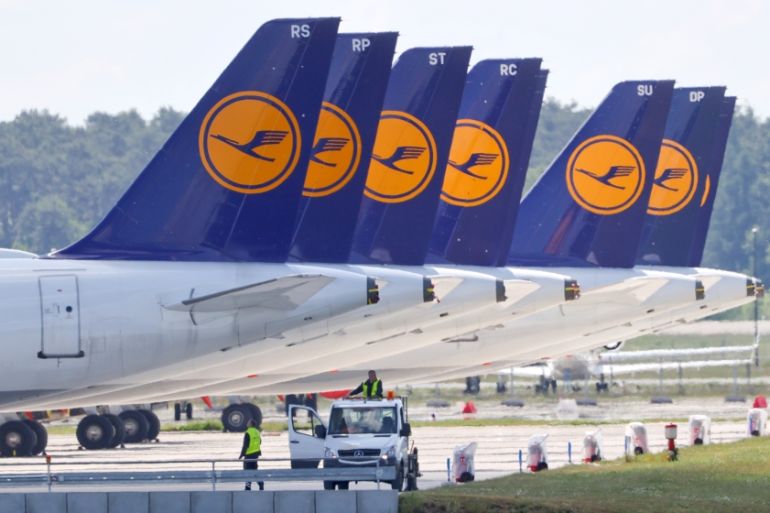Turbulence: Lufthansa sees weak air travel until at least 2024
Posting its worst-ever quarterly loss, the German airline said passenger numbers fell 96 percent in April-June period.

Germany’s Lufthansa says it does not expect air travel demand to return to pre-crisis levels before 2024 as a steep drop in revenue pushed it to its worst-ever quarterly operating loss of 1.7 billion euros ($2bn).
The airline said on Thursday the collapse in demand for air travel due to the coronavirus pandemic meant it carried 96 percent fewer passengers between April and June than a year earlier, leading to an 80 percent drop in second-quarter revenue to 1.9 billion euros ($2.3bn).
Keep reading
list of 4 itemsMexico’s teachers seek relief from pandemic-era spike in school robberies
‘A bad chapter’: Tracing the origins of Ecuador’s rise in gang violence
Why is the US economy so resilient?
Despite cost cuts, it posted an operating loss of 1.7 billion euros ($2bn), adjusted for items such as exchange-rate fluctuations and asset sales, compared with 754m euros ($895m) a year earlier – the worst quarterly result in the company’s 67-year history.
“We are experiencing a caesura in global air traffic. We do not expect demand to return to pre-crisis levels before 2024,” Chief Executive Carsten Spohr said, adding the company would not be spared a “far-reaching restructuring” of its business.
The company, which had 129,400 employees as of the end of June, said forced redundancies can no longer be ruled out in Germany.
Costly bailout
Lufthansa said last month it would cut 20 percent of its leadership positions and 1,000 administrative jobs as it seeks to repay a nine billion euro ($10.7bn) state bailout and navigate deepening losses in the face of the coronavirus pandemic.
The bailout has saddled the German carrier with a mountain of debt and higher interest payments which it needed in order to avoid insolvency. It has received 2.3 billion euros ($2.7bn) of the facility since the start of July.
A sale of assets including a stake in the group’s aircraft-maintenance arm and the rest of its in-flight catering business could be one way of reducing the debt burden, analysts have said, though the group did not mention disposals in its statement.
Shares of Lufthansa have fallen 50 percent so far this year, compared with a 45 percent decline in the six-member Bloomberg EMEA Airlines Index.
Lufthansa said it plans to increase short- and medium-haul capacity to about 40 percent of the prior-year period in the third quarter and to about 20 percent of pre-coronavirus levels on long-haul routes.
In the fourth quarter, it expects short- and medium-haul capacity to rise to 55 percent and to 50 percent on long-haul routes. Rival Air France-KLM, which also secured state-backed aid, aims to operate at two thirds of pre-virus capacity before the end of the year.
The company said it expects to post an adjusted operating loss in the second half of 2020 and a further significant decline in adjusted operating profit for the full-year due to very limited operation of important long-haul routes.